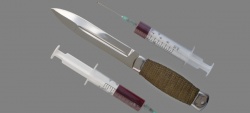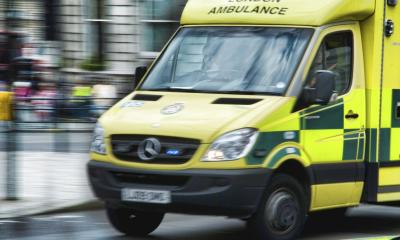Aggression in hospitals
A receptionist threatened with a butcher’s knife in Bourgoin-Jallieu (Isère); gunshots in an emergency unit in Delafontaine, at Saint-Denis, near Paris; a nurse wounded with a knife in a Marseille hospital – three separate incidents in just one week last August brought into sharpe focus what has become a worrying phenomenon.


Indeed, incidents have increased by 80% in the last five years, according to doctors and hospital workers.
Now, the Association des Médecins Urgentistes de France (AMUF), a union gathering emergency care unit events, has pressed the alarm-bell, and is expecting the Ministers of Health and the Interior to come up with ‘concrete measures to address such explosive situations, unbearable not only for patients but for healthcare workers’.
According to Dr Patrick Pelloux, the outspoken President of AMUF, aggressive acts in emergency wards are not a new phenomenon. The union was created 16 years ago following the first death that took place inside a hospital compound in the wake of a shooting incident near Paris.
‘The hospital is a mirror of society, and our society is more violent nowadays. In emergency units we are at the heart of crisis situations. We are here to treat the victims of aggression as well as their attackers,’ Dr Pelloux points out.
On the cause of violent acts, he stresses that waiting is the main issue. In Marseille, and later in Bourgoin-Jallieu where a nurse was knifed, the patients could not bear the waiting and so attacked healthcare staff.
François Hollande pledged that no French citizen should be more than 30 minutes away from an emergency care facility. That measure should apply to the waiting line once a person arrives in the emergency unit, Dr Pelloux explains.
‘There is,’ he adds, ‘a need to humanise the hospital environment. Some of them do not even let the patient’s families inside. Healthcare facilities have become “bunkerised”. That means very negatively perceived by patients.
‘We now expect something concrete from the government, for example to redesign emergency unit architecture to organise the rotation of people better. We don’t want to create bunkers. However, we would like, for example, secure cubicles for violent people and specific pathways for psychiatric cases.
‘We also notice high tension between medical workers and patients because of insufficient staff. Patients become nervous and the medical personnel, under stress because of too many job cuts, tend to be less tolerant. In this respect, some find Canada’s policy of placing mediators between patients and medical staff interesting.’
Dr Pelloux rejects as insane the idea of posting soldiers within hospitals, as suggested by some members of Marseille’s city council. ‘Can we welcome our patients with machine-guns around? No. One must keep a cool head in the face of these incidents. All we need is better coordination between emergency wards and the police, so that their interventions become more reactive and adequate.’
In the past, government author-ities have always offered the same wrong response, which is to provide more security guards. We’d much prefer an alarm system directly linked to the police, just like in banks or jewellery stores. If we know how to protect jewellery or precious paintings, we could do the same for the personnel of emergency units.
Security guards are costly and 99% of the time nothing happens, so their presence is a waste. In the remaining one percent, they cannot cope with the situation. We have repeatedly said that we need to have the police in position to intervene more rapidly and adequately,’ Dr Pelloux explains.
The last report from the Observatoire des violences en milieu de santé (ONVS), a national body that monitors acts of violence, states that the increase of incidents has actually been 100% in one year: 11,344 incidents (71% of which involved people, the rest concerning hospital equipment) were reported by health institutions in 2012, compared to 5,760 in 2011.
The psychiatry units are the worst hit (2,886), followed by emergency wards (1,611against 865 in 2011), geriatrics (1,166) and general medicine (932). In the Ile-de-France region around Paris, accounts for 30 percent of reported violent acts.
However, the ONVS wants to put those figures into perspective: ‘The number of hospitals that reported acts of violence increased a lot in 2012, notably the AP-HP (the entity regrouping 37 Parisian hospitals), says Stéphane Grossier, spokesman for ONVS. ‘Things are beginning to be told openly. Hospitals are no longer reluctant to admit that violent incidents can happen in their facilities, and less fearful that this could be understood as malfunctioning on their part.’
Profile:
Patrick Pelloux was joint-chief of emergency unit at the Saint-Antoine hospital in Paris from 2005 to 2008 before joining the Service d’Aide Médicale Urgente (SAMU) in Paris. He has presided over the Association Française des Médecins Urgentistes (AFUR) since 1998 and, in summer 2003 he became a public figure after he pointed out the lack of hospital resources to deal with the heat wave. This led to the resignation of the then Minister of Health. Hospitals as well as retirement homes were later obliged to make the necessary investments to cope with heat wave episodes.
09.07.2014






